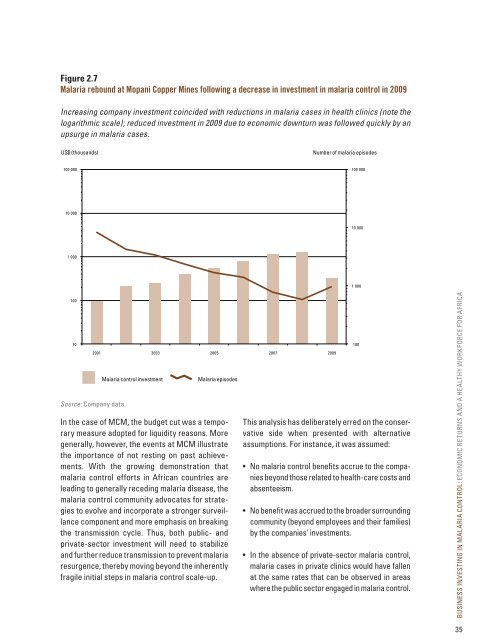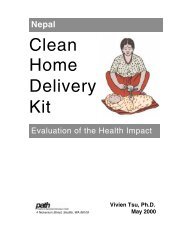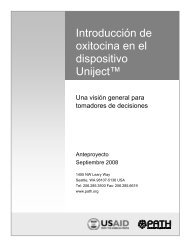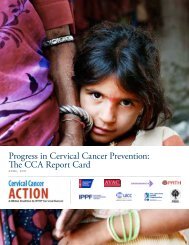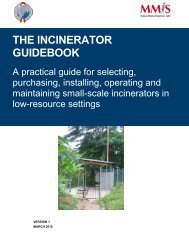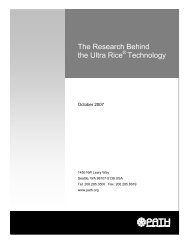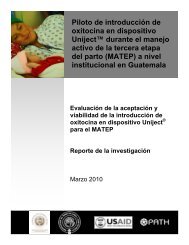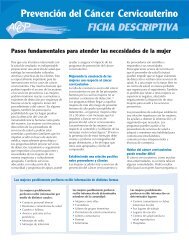Business Investing in Malaria Control: Economic Returns and ... - Path
Business Investing in Malaria Control: Economic Returns and ... - Path
Business Investing in Malaria Control: Economic Returns and ... - Path
Create successful ePaper yourself
Turn your PDF publications into a flip-book with our unique Google optimized e-Paper software.
Figure 2.7<br />
<strong>Malaria</strong> rebound at Mopani Copper M<strong>in</strong>es follow<strong>in</strong>g a decrease <strong>in</strong> <strong>in</strong>vestment <strong>in</strong> malaria control <strong>in</strong> 2009<br />
Increas<strong>in</strong>g company <strong>in</strong>vestment co<strong>in</strong>cided with reductions <strong>in</strong> malaria cases <strong>in</strong> health cl<strong>in</strong>ics (note the<br />
logarithmic scale); reduced <strong>in</strong>vestment <strong>in</strong> 2009 due to economic downturn was followed quickly by an<br />
upsurge <strong>in</strong> malaria cases.<br />
US$ (thous<strong>and</strong>s)<br />
Number of malaria episodes<br />
100 000<br />
100 000<br />
10 000<br />
10 000<br />
1 000<br />
1 000<br />
100<br />
10<br />
2001 2003 2005 2007 2009<br />
Source: Company data.<br />
<strong>Malaria</strong> control <strong>in</strong>vestment<br />
<strong>Malaria</strong> episodes<br />
In the case of MCM, the budget cut was a temporary<br />
measure adopted for liquidity reasons. More<br />
generally, however, the events at MCM illustrate<br />
the importance of not rest<strong>in</strong>g on past achievements.<br />
With the grow<strong>in</strong>g demonstration that<br />
malaria control efforts <strong>in</strong> African countries are<br />
lead<strong>in</strong>g to generally reced<strong>in</strong>g malaria disease, the<br />
malaria control community advocates for strategies<br />
to evolve <strong>and</strong> <strong>in</strong>corporate a stronger surveillance<br />
component <strong>and</strong> more emphasis on break<strong>in</strong>g<br />
the transmission cycle. Thus, both public- <strong>and</strong><br />
private-sector <strong>in</strong>vestment will need to stabilize<br />
<strong>and</strong> further reduce transmission to prevent malaria<br />
resurgence, thereby mov<strong>in</strong>g beyond the <strong>in</strong>herently<br />
fragile <strong>in</strong>itial steps <strong>in</strong> malaria control scale-up.<br />
This analysis has deliberately erred on the conservative<br />
side when presented with alternative<br />
assumptions. For <strong>in</strong>stance, it was assumed:<br />
• No malaria control benefits accrue to the companies<br />
beyond those related to health-care costs <strong>and</strong><br />
absenteeism.<br />
• No benefit was accrued to the broader surround<strong>in</strong>g<br />
community (beyond employees <strong>and</strong> their families)<br />
by the companies' <strong>in</strong>vestments.<br />
• In the absence of private-sector malaria control,<br />
malaria cases <strong>in</strong> private cl<strong>in</strong>ics would have fallen<br />
at the same rates that can be observed <strong>in</strong> areas<br />
where the public sector engaged <strong>in</strong> malaria control.<br />
100<br />
BUSINESS INVESTING IN MALARIA CONTROL: ECONOMIC RETURNS AND A HEALTHY WORKFORCE FOR AFRICA<br />
35


